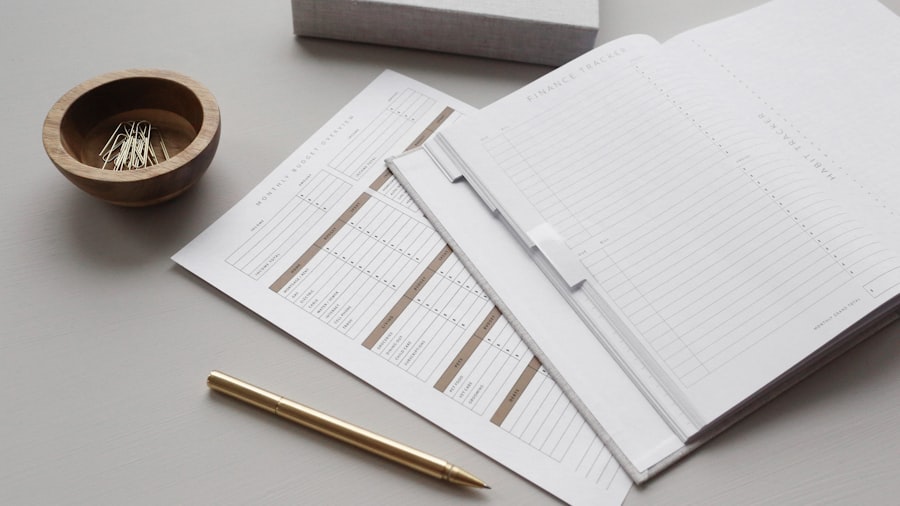Inflation is a term that you may have heard frequently, especially in discussions about the economy and personal finance. At its core, inflation refers to the general increase in prices of goods and services over time, which ultimately erodes the purchasing power of your money. When inflation rises, each dollar you hold buys fewer goods and services than it did before.
This can significantly impact your financial situation, as you may find that your income does not stretch as far as it once did. Understanding how inflation works is crucial for making informed financial decisions that can help you maintain your standard of living. As you navigate through periods of inflation, it’s essential to recognize how it affects various aspects of your finances.
For instance, if you have a fixed income, such as a salary or pension, rising prices can create a strain on your budget. You may need to adjust your spending habits or find ways to increase your income to keep up with the cost of living. Additionally, inflation can influence interest rates, which can affect loans and credit cards.
By understanding these dynamics, you can better prepare yourself to mitigate the adverse effects of inflation on your financial health.
Key Takeaways
- Inflation can erode the purchasing power of your money, impacting your savings and investments.
- Creating a budget can help you combat the effects of inflation by managing your expenses and saving more.
- Investing in inflation-resistant assets such as real estate, commodities, and Treasury Inflation-Protected Securities (TIPS) can help preserve your wealth.
- Diversifying your investment portfolio with a mix of stocks, bonds, and alternative investments can provide protection against inflation.
- Taking advantage of tax-advantaged accounts like 401(k)s and IRAs can help you save more for the future while reducing your tax burden.
Creating a Budget to Combat Inflation
Creating a budget is one of the most effective strategies you can employ to combat the effects of inflation on your finances. A well-structured budget allows you to track your income and expenses, helping you identify areas where you can cut back or reallocate funds. Start by listing all your sources of income and then categorize your expenses into fixed and variable costs.
Fixed costs include rent or mortgage payments, while variable costs encompass groceries, entertainment, and other discretionary spending. By having a clear picture of your financial landscape, you can make informed decisions about where to tighten your belt. As inflation continues to rise, it’s wise to revisit your budget regularly.
Prices for everyday items may fluctuate, and what was once an affordable expense could become a financial burden. By adjusting your budget to reflect these changes, you can ensure that you are living within your means while still allowing for necessary expenditures. Consider setting aside a portion of your income for savings or emergency funds, as this can provide a buffer against unexpected price increases or financial emergencies.
Investing in Inflation-Resistant Assets

When inflation is on the rise, investing in inflation-resistant assets becomes increasingly important for preserving your wealth. These assets typically include commodities like gold and silver, real estate, and certain types of stocks that have historically outperformed during inflationary periods. By diversifying your investment portfolio with these types of assets, you can help protect your purchasing power against the eroding effects of inflation.
Real estate, for example, often appreciates in value over time and can provide rental income that may increase with inflation. Similarly, commodities like gold are often seen as a safe haven during economic uncertainty. When considering investments, it’s essential to conduct thorough research and understand how different assets perform in various economic conditions.
By strategically allocating your investments toward inflation-resistant options, you can create a more resilient financial future.
Diversifying Your Investment Portfolio
| Investment Type | Percentage Allocation | Risk Level |
|---|---|---|
| Stocks | 40% | High |
| Bonds | 30% | Medium |
| Real Estate | 20% | Medium |
| Commodities | 10% | High |
Diversification is a fundamental principle of investing that can help mitigate risk and enhance returns. As you consider how to protect yourself from inflation, diversifying your investment portfolio becomes even more critical. By spreading your investments across various asset classes—such as stocks, bonds, real estate, and commodities—you reduce the impact that any single investment’s poor performance could have on your overall financial health.
In times of inflation, certain sectors may perform better than others. For instance, consumer staples tend to hold their value better during economic downturns because people still need to purchase essential goods regardless of price increases. By including a mix of growth stocks, dividend-paying stocks, and alternative investments in your portfolio, you position yourself to weather the storm of inflation more effectively.
Regularly reviewing and rebalancing your portfolio ensures that it aligns with your financial goals and risk tolerance.
Taking Advantage of Tax-Advantaged Accounts
Utilizing tax-advantaged accounts is another strategy that can help you combat the effects of inflation on your finances. Accounts such as 401(k)s, IRAs, and Health Savings Accounts (HSAs) offer tax benefits that can enhance your savings potential over time. Contributions to these accounts often reduce your taxable income, allowing you to save more effectively for retirement or medical expenses without being penalized by taxes.
Moreover, the growth within these accounts is typically tax-deferred or tax-free, depending on the type of account. This means that as your investments grow over time—potentially outpacing inflation—you won’t have to pay taxes on those gains until you withdraw the funds. By maximizing contributions to these accounts, you not only prepare for future expenses but also create a financial cushion that can help offset the impact of rising prices.
Negotiating Lower Interest Rates on Loans and Credit Cards

In an environment where inflation is prevalent, managing debt becomes increasingly important.
High-interest debt can quickly become unmanageable when prices are rising, so taking proactive steps to reduce these rates can save you significant amounts in interest payments over time.
Start by reviewing your current loans and credit card statements to identify any high-interest debts. Then, reach out to your lenders or credit card companies to discuss potential rate reductions. Be prepared to present a strong case for why they should lower your rates—such as a history of on-time payments or improved credit scores.
Many lenders are willing to negotiate in order to retain customers, so don’t hesitate to advocate for yourself.
Cutting Unnecessary Expenses
As inflation continues to impact everyday life, cutting unnecessary expenses becomes a vital strategy for maintaining financial stability. Begin by reviewing your monthly spending habits and identifying areas where you can trim costs without sacrificing quality of life. This might include canceling subscriptions you rarely use or opting for more affordable alternatives when dining out or shopping.
Additionally, consider adopting a more frugal mindset by seeking out discounts and deals before making purchases. Utilizing coupons, shopping during sales events, or even buying in bulk can help stretch your dollars further in an inflationary environment. By being mindful of your spending habits and making conscious choices about where to allocate your resources, you can create a more sustainable financial situation that withstands the pressures of rising prices.
Increasing Your Income through Side Hustles or Freelancing
In times of rising inflation, increasing your income can be an effective way to counterbalance the effects on your finances. One way to achieve this is by exploring side hustles or freelancing opportunities that align with your skills and interests. Whether it’s offering consulting services in your area of expertise or starting an online business selling handmade goods, there are countless avenues available for generating additional income.
Consider leveraging platforms like Upwork or Fiverr to find freelance gigs that match your skill set. Alternatively, if you have a hobby that could be monetized—such as photography or writing—explore ways to turn that passion into profit. By diversifying your income streams, you not only create a buffer against inflation but also open up new opportunities for personal growth and financial independence.
Paying Off High-Interest Debt
One of the most effective ways to protect yourself from the adverse effects of inflation is by paying off high-interest debt as quickly as possible. High-interest loans and credit card balances can quickly accumulate interest charges that outpace any potential gains from investments or savings accounts. By prioritizing debt repayment, you free up more of your income for savings and investments that can help combat inflation.
Start by creating a plan to tackle high-interest debts systematically. You might choose to focus on the debt with the highest interest rate first (the avalanche method) or pay off smaller debts first for psychological motivation (the snowball method). Whichever approach you choose, committing to reducing debt will not only improve your financial situation but also provide peace of mind as you navigate an uncertain economic landscape.
Keeping an Eye on the Consumer Price Index
Monitoring the Consumer Price Index (CPI) is essential for understanding how inflation affects the economy and your personal finances. The CPI measures changes in the price level of a basket of consumer goods and services over time, providing valuable insights into inflation trends. By keeping an eye on CPI reports, you can better anticipate price changes and adjust your budget accordingly.
Understanding CPI trends allows you to make informed decisions about spending and investing. For instance, if you notice that certain categories—such as food or energy—are experiencing significant price increases, it may be wise to adjust your budget or consider alternative options in those areas. Staying informed about economic indicators like CPI empowers you to take proactive steps in managing your finances effectively.
Seeking Professional Financial Advice for Inflation-Proofing Strategies
Finally, seeking professional financial advice can be invaluable when it comes to developing strategies for inflation-proofing your finances. A certified financial planner or advisor can provide personalized guidance tailored to your unique situation and goals. They can help you navigate complex investment options, create a comprehensive budget plan, and identify opportunities for growth amidst rising prices.
Working with a professional allows you to gain insights into market trends and investment strategies that may not be readily available through self-research alone. They can also assist in creating a long-term financial plan that accounts for potential economic fluctuations due to inflation. By investing in professional advice now, you position yourself for greater financial security in the future.
In conclusion, navigating the challenges posed by inflation requires proactive planning and strategic decision-making regarding your finances. By understanding inflation’s impact on purchasing power and implementing effective strategies such as budgeting, investing wisely, cutting unnecessary expenses, and seeking professional advice, you can better protect yourself against rising prices while working toward achieving long-term financial goals.
In today’s economic climate, managing personal finances effectively is more crucial than ever, especially when it comes to combating inflation. One useful strategy is to focus on budgeting and cutting unnecessary expenses, which can help stretch your dollars further. Additionally, investing in assets that typically outpace inflation, such as stocks or real estate, can be a wise move. For more detailed insights and strategies on how to navigate these financial challenges, you can check out this related article on personal finance tips to fight inflation by visiting com/’>How Wealth Grows.
This resource offers practical advice and expert opinions to help you safeguard your financial future.
💸WATCH THIS! The Hidden Tax That Makes Everything You Buy a Scam
FAQs
What is inflation?
Inflation is the rate at which the general level of prices for goods and services is rising, and subsequently, the purchasing power of currency is falling.
How does inflation affect personal finance?
Inflation can erode the purchasing power of money, making it more expensive to buy goods and services. This can impact savings, investments, and overall financial planning.
What are some personal finance tips to fight inflation?
Some personal finance tips to fight inflation include investing in assets that tend to perform well during inflation, such as real estate and commodities, diversifying investment portfolios, and considering inflation-protected securities.
How can individuals protect their savings from inflation?
Individuals can protect their savings from inflation by investing in assets that tend to outpace inflation, such as stocks, real estate, and inflation-protected securities. It’s also important to regularly review and adjust investment strategies to account for inflation.
What are some ways to adjust spending habits to combat inflation?
To combat inflation, individuals can adjust their spending habits by prioritizing essential expenses, seeking out discounts and deals, and considering alternatives for expensive purchases. It’s also important to budget and track expenses to ensure financial stability.
